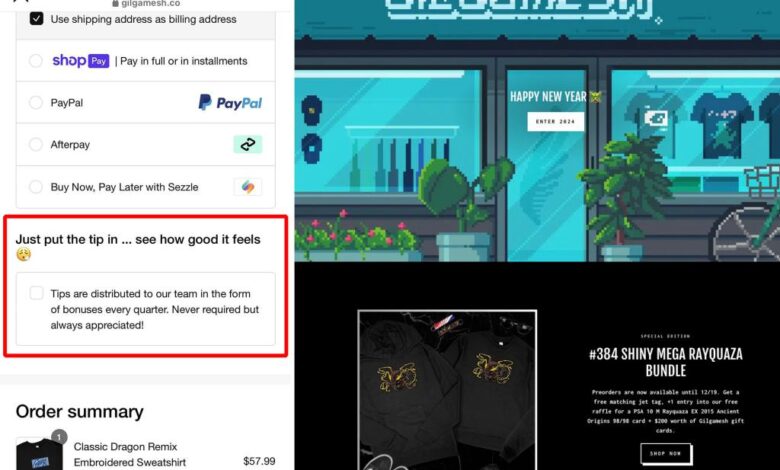Online shopper asked for tip — to cover workers’ quarterly bonuses

This is just the tip of the iceberg.
There has been a lot of backlash over “tipflation” on the internet recently, with the growth of tipping culture seeping into coffee shops, takeout stores and self-checkouts.
One frustrated Reddit user recently posted on t/EntTipping thread to share that he was prompted with a request to tip while online shopping for clothes.
While checking out on the website for clothing brand Gilgamesh, user travishummel was asked to leave a tip, with an off-color prompt that snarked, “Just put the tip in … see how good it feels.”
But the prompt then specified: “Tips are distributed to our team in the form of bonuses every quarter. Never required but always appreciated!”
The Post has reached out to the company for comment.
The verbiage assumes that the employees of the brand rely on customer tips for quarterly bonuses, and people in the comments of the Reddit thread were taken aback by the request.

“So not only am I subsidizing restaurant owners, now I’m responsible for company bonuses. How is this not reverse socialism?” one person questioned.
“PAY YOUR F–KING EMPLOYEES,” another exclaimed.
“Omg. The problem is this guilt-s–t works on so many people … it’s probably lucrative to add this l’il donation line. Aggravating. We have to make this against the law,” someone suggested.
“This is becoming more and more common. Why? Because the vast majority of people are tip-washed and will do it. It’s pretty ridiculous, especially that one,” a user wrote. “So now us customers are expected to pay their wage AND bonuses? F–k right off with all that.”
“This is wildly inappropriate lol,” someone else said.

Travis is certainly not the first person to complain about how tipping has become “emotional blackmail.”
Despite requiring zero interaction between customers and employees, self-checkout machines at venues like coffee shops, bakeries, airports and sports stadiums are being programmed with the option to leave the typical 20% tip.
Business owners believe that the prompt for a tip can boost staff pay and increase gratuities, according to a May report from the Wall Street Journal.
The self-checkout gratuity option is an example of “tip creep” — a phenomenon that prompts customers to leave higher tips in transactional situations.
Self-tipping is viewed by many customers as a way to guilt-trip the person into tipping on something when they typically wouldn’t.
“Just the prompt, in general, is a bit of emotional blackmail,” Garrett Bemiller, 26, who works in public relations in Manhattan, told WSJ after he was asked to add a 10% to 20% tip on his $6 water bottle at an airport self-checkout machine.
However, experts say that tips at a self-checkout machine might never even get to an actual employee, since protections for tipped workers in the federal Fair Labor Standards Act don’t extend to machines, according to the Journal.
Lehigh University associate professor Holona Ochs told the Journal that self-checkout tipping “exploits the high adherence to tipping norms as a way to generate more revenue for the company.”
Research has shown that digital tipping options usually result in customers leaving a tip from 18% to 30% and higher, though many say they refuse to tip for fast food and self-serve.
A survey conducted in June 2023 revealed that two-thirds of Americans hold a negative view of tipping, and 1 in 3 Americans think tipping culture is out of control.
For Gen Z in particular, only 24% always tip hairdressers, hairstylists or barbers, according to the survey, compared with 40% of millennials and 67% of Gen Xers. They are also less likely than baby boomers to tip when getting food delivered (31% compared to 62%) or using a taxi or ride-share service (22% versus 56%).
Results found that tipping in all kinds of settings is falling, including in dine-in restaurants, hair salons, hotels, coffee shops, and taxis and ride-share vehicles. It’s also declining for food delivery and takeout.




